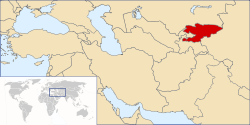Kyrgyzstan: Distrust In Police Means Privatization Of Law And Order
By Eurasianet
By Chris Rickleton
One morning last year in Bishkek, Kyrgyzstan, Dilnoza awoke to find her brand-new Toyota Corolla missing. She knew immediately whom to call, and it wasn’t her local police precinct.
Dilnoza sought the help of a private security agency. And after six days of searching, the firm’s operatives finally tracked down and recovered Dilnoza’s car, which was found in a village outside the Kyrgyz capital, Bishkek. Asked why she didn’t go to the police, she provided a practical answer.

“I paid the company, so they had an incentive to find it. The police did not,” Dilnoza, 33, explained.
Over the past eight years, Kyrgyzstan has seen two presidents chased from office amid violent street protests and widespread looting. As a result, and thanks to widespread corruption, public trust in the police has plummeted. It’s not surprising, then, that a rising number of individuals and businesses are placing their faith in private security agencies to protect property and investigate crimes.
According to figures confirmed by an Interior Ministry official, there are now over 400 private agencies licensed to carry weapons and provide security services in Kyrgyzstan; roughly 30 are operational year-round. Many, including the firm hired by Dilnoza, who describes herself as “economically comfortable,” refuse to discuss their activities. At the agency’s insistence Dilnoza declined to give her surname for this EurasiaNet.org story.
Of the active Bishkek-based companies, 13 are members of the Union of Security Agencies, a forum that meets regularly with police officials to discuss security-related issues. But while officers from the Interior Ministry attend meetings, says Vladimir Bessarabov, the CEO of Barracuda, a private security and detective agency, cooperation among private and public security structures is rare. “Police see us as their competition,” Bessarabov told EurasiaNet.org.
This is logical, adds Bessarabov, whose firm has grown from 30 employees when it was founded in 2004 to one with 200 staff today, catering both to private individuals and corporate concerns, including the local Coca-Cola bottler. The police also provide guard-for-hire services in exchange for cash, he says. But the private forces are better-paid and more professional.
Union of Security Agencies members send employees to a course — run by Dordoi Securities, one of the largest private firms with about 800 employees — where employees undergo psychological testing and training in first aid and weapons handling. Kyrgyzstan’s police academy, on the other hand, has a reputation for being a den of graft. A reported brawl at the academy’s graduation party last summer also dented its reputation for professionalism.
“We try not to hire from the ranks of the Ministry of Internal Affairs, because police here are full of bad habits,” Bessarabov continued. “The force is corrupt, and their definition of service doesn’t correspond to the level of work I demand from my guys.”
Many Bishkek residents simply feel that police officers are more interested in using their positions for their personal benefit, rather than promoting public safety.
Omurbek Suvanaliyev, a career police officer who once served briefly as interior minister under ousted president Kurmanbek Bakiyev, admits that a demoralized police force has lost credibility in the eyes of the public. “People understand that the security structures exist to defend the head of state and other high ranking politicians,” he told EurasiaNet.org. “They [police] have lost their civil functions.”
Nevertheless, Suvanaliyev argues, the rise of private security and detective firms that don’t answer to a centralized chain of command carries risks. Such security agencies can provide cover for criminal activity, he asserted.
“We refused to grant licenses to people we considered a threat to public safety,” says Suvanaliyev, who was twice Bishkek’s police chief and now styles himself an opposition politician. “But later, the Bakiyev family started giving security firm licenses away to everybody, [including] their criminal connections and drug runners.”
Customers like Dilnoza face a choice between potential criminality in the private agencies and open demands for kickbacks by police officers. “The police are thieves, we see this every day,” she said.
As an ethnic minority without connections in the force, she also feels police are less likely to respond to any request for help. “It is about what you can afford and who will protect your interests better,” she said.
Chris Rickleton is a Bishkek-based journalist.
